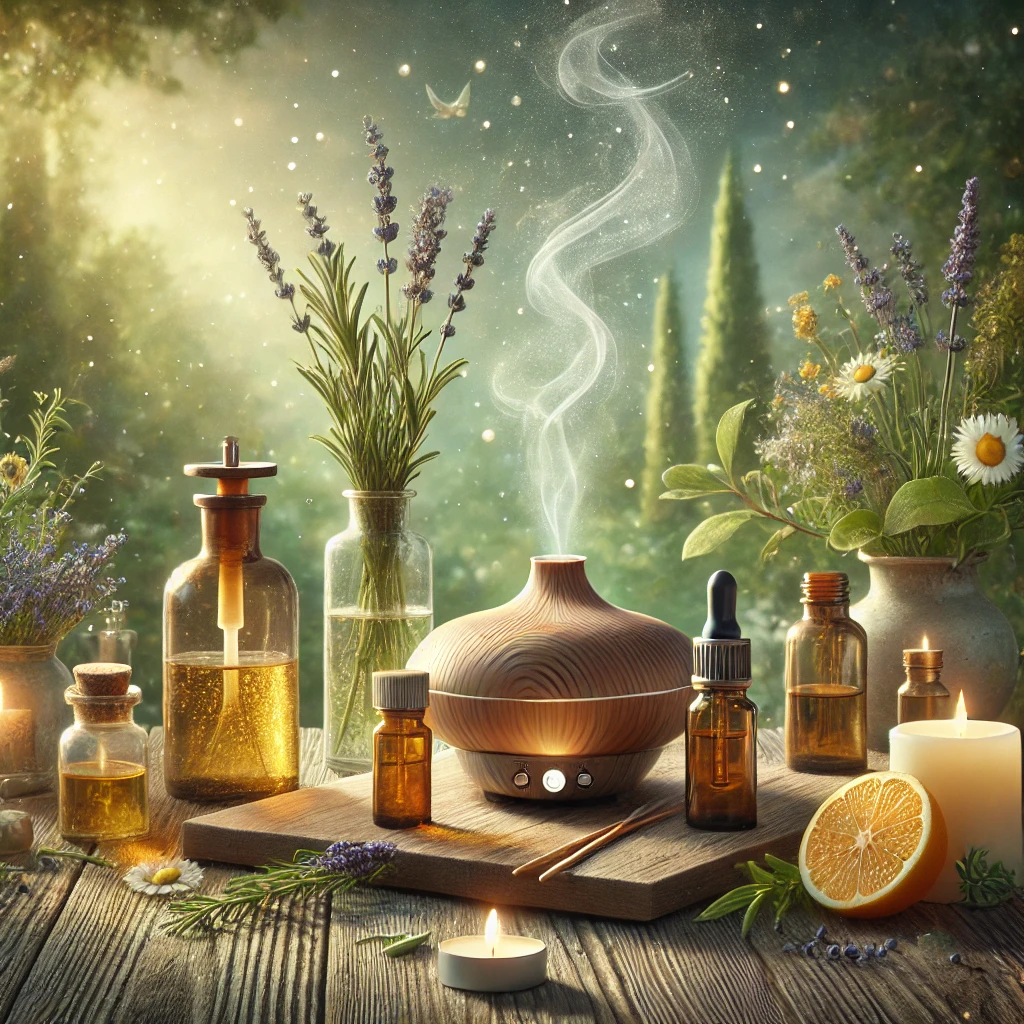Definition
Aromatherapy is a holistic healing practice that uses natural plant extracts, known as essential oils, to promote physical, emotional, and spiritual well-being. Essential oils are highly concentrated plant compounds extracted from flowers, leaves, roots, bark, and other plant materials. These aromatic oils contain the essence of the plant’s healing properties and are used in various therapeutic applications, including inhalation, topical application, and diffusion.
History of Aromatherapy
Aromatherapy has been used for thousands of years across many cultures:
- Ancient Egypt – Essential oils were used in embalming, medicine, and spiritual rituals.
- Traditional Chinese Medicine (TCM) – Incorporated aromatic herbs for balancing Qi and treating ailments.
- Ayurveda – Used plant extracts and oils to restore balance and enhance vitality.
- Greek & Roman Influence – Physicians like Hippocrates and Galen recognized the healing power of aromatic plants.
- Modern Aromatherapy – The term “aromatherapy” was coined by French chemist René-Maurice Gattefossé in the 20th century, leading to widespread scientific exploration of essential oils.
How Aromatherapy Works
Aromatherapy works through olfactory stimulation and skin absorption, influencing both the limbic system (which governs emotions and memory) and the body’s physiological responses.
1. Inhalation
- Essential oil molecules interact with the olfactory system, sending signals to the brain to trigger relaxation, alertness, or emotional balance.
- Inhaled oils can also support the respiratory system, reducing congestion and inflammation.
2. Topical Application
- When diluted with a carrier oil, essential oils can be applied to the skin, allowing absorption into the bloodstream.
- Oils like lavender, peppermint, and tea tree can aid with skin conditions, pain relief, and muscle relaxation.
3. Diffusion & Environmental Use
- Essential oils can be diffused into the air to purify the environment, improve mood, and support immune health.
Benefits of Aromatherapy
1. Emotional & Mental Well-Being
- Reduces stress, anxiety, and depression (Lavender, Chamomile, Rose)
- Enhances mood and emotional balance (Citrus oils, Ylang-Ylang)
- Improves focus and cognitive function (Peppermint, Rosemary)
2. Physical Health Benefits
- Supports respiratory health (Eucalyptus, Tea Tree)
- Relieves headaches and migraines (Peppermint, Frankincense)
- Aids digestion and nausea (Ginger, Peppermint)
- Reduces inflammation and pain (Turmeric, Helichrysum)
3. Sleep & Relaxation
- Induces deep sleep and relaxation (Lavender, Vetiver)
- Calms an overactive nervous system (Sandalwood, Cedarwood)
4. Immune & Skin Support
- Antibacterial and antiviral properties (Tea Tree, Oregano)
- Skin healing and anti-aging (Rosehip, Frankincense)
Popular Essential Oils & Their Uses
| Essential Oil | Primary Benefits |
|---|---|
| Lavender | Calming, sleep aid, skin healing |
| Peppermint | Energizing, relieves headaches, aids digestion |
| Tea Tree | Antimicrobial, acne treatment, immune support |
| Eucalyptus | Respiratory relief, decongestant, antiseptic |
| Frankincense | Meditation aid, skin rejuvenation, emotional grounding |
| Lemon | Uplifting, detoxifying, antibacterial |
| Rosemary | Memory enhancement, mental clarity, hair health |
| Chamomile | Stress relief, anti-inflammatory, skin soothing |
| Sandalwood | Spiritual grounding, relaxation, skin nourishment |
| Ylang-Ylang | Mood enhancer, aphrodisiac, stress relief |
Methods of Using Essential Oils
1. Diffusers & Inhalers
- Ultrasonic diffusers disperse essential oil mist into the air.
- Personal inhalers provide portable aromatherapy benefits.
2. Massage & Topical Application
- Always dilute essential oils with a carrier oil (e.g., coconut, jojoba, or almond oil) before applying to skin.
- Apply to pulse points, temples, and feet for relaxation.
3. Baths & Compresses
- Adding a few drops to a warm bath enhances relaxation.
- A warm or cold compress infused with essential oils can ease pain and inflammation.
4. Household & Cleaning Uses
- Essential oils can be added to natural cleaning products for antibacterial properties (e.g., Lemon, Tea Tree).
Precautions & Safety Considerations
- Dilution – Essential oils are highly concentrated and should always be diluted before applying to skin.
- Photosensitivity – Citrus oils (Lemon, Bergamot, Grapefruit) can cause sun sensitivity.
- Pregnancy & Children – Some oils are not safe for pregnant women or young children.
- Allergic Reactions – Always do a patch test before using a new essential oil.
- Ingestion Warning – Not all essential oils are safe for internal use unless under professional guidance.
Conclusion
Aromatherapy and essential oils offer a powerful, natural way to support physical, emotional, and spiritual well-being. Whether used for relaxation, immune support, or personal care, these potent plant extracts connect us to nature’s healing essence. With proper use and respect for their potency, essential oils can become a valuable tool in holistic wellness practices.

